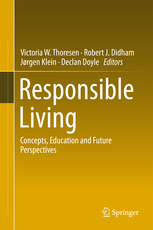Responsible Living: Concepts, Education and Future Perspectives

Responsible Living is concerned with how individuals can guide the transition toward sustainable development. Education is seen as essential to this. Therefore this book’s chapters cover broad topics, in a wide range of countries, related to education for sustainability. These include traditional educational tools such as formal curricula, as well as the use of social media, workshops, exhibitions, activism and games to promote more ethical thinking and behaviour.
For example, a programme called Supporting Urban Sustainability (SUS) has been implemented in 14 countries in Africa, Asia and Europe. SUS gathers civil society and local government officials to learn about and act on urban poverty alleviation based on ecosystem services. It is a collaborative and practice-oriented approach to learning that shows that education is not just about classrooms and children. Learning outcomes of programmes such as SUS are assessed to gauge the positive impact they are having on information sharing and relationship building. This kind of activity is seen as important to ensuring that broader educational agendas, such as the Sustainable Development Goals (SDGs), are widely diffused. Otherwise the SDGs risk being a lofty exercise that many ordinary people feel is irrelevant to them.
One aspect discussed frequently in the book is the “value-action gap”. That is, many people profess to want to lead more responsible lifestyles, yet what they say does not match what they do. Research has found that it may be disempowering to dwell endlessly on bleak scenarios; rather, individuals may be more motivated to turn their values into actions if they are presented with the positive consequences of doing so. Recent studies have also highlighted that it is to key to capture emotional and not just intellectual drivers of behavioural change. There have many been attempts to close the value-action gap in educational settings, such as among youth discussing post-conflict discrimination in Sierra Leone. There, simply discussing the existence of the gap was shown to help mitigate it.
These discussions raise some philosophical questions about what makes for a good life. First, the authors appear to see environmental preservation, protection of the displaced, and other things as universally cherished ideals. Yet the importance of context may make such sweeping statements more complicated in particular situations.
Moreover, sustainable development is concerned with a holistic approach to the wellbeing of people and the planet, and personal fulfilment is increasingly seen as some as another measure of a balanced lifestyle. Are having a sense of purpose, being empowered to contribute socially, etc. only the preserve of the privileged? The absence of these aspects may be another form of deprivation that development practitioners could seek to address in the future. Of course, attention to the structural contributors and barriers to ethical engagement is crucial. Responsible Living explores both the power and the limitations of transformational education.
Further reading:
Lee-Smith, Diana and Taranum Chaudhry (1990), “Environmental information for and from children”, Environment and Urbanization Vol 2, No 2, pages 27–32, available at http://eau.sagepub.com/content/2/2/27.abstract.
Sustainability (2013), Special Issue “Communication for and about Sustainability”, Vol 5/6, available at http://www.mdpi.com/journal/sustainability/special_issues/communication-sustainability.
UNESCO (2014), UNESCO Roadmap for Implementing the Global Action Programme on Education for Sustainable Development, Paris, 37 pages, available at http://unesdoc.unesco.org/images/0023/002305/230514e.pdf.
Book note prepared by Christine Ro
Search the Book notes database
Our Book notes database contains details and summaries of all the publications included in Book notes since 1993 - with details on how to obtain/download.
Use the search form above, or visit the Book notes landing page for more options and latest content.
For a searchable database for papers in Environment and Urbanization, go to http://eau.sagepub.com/

